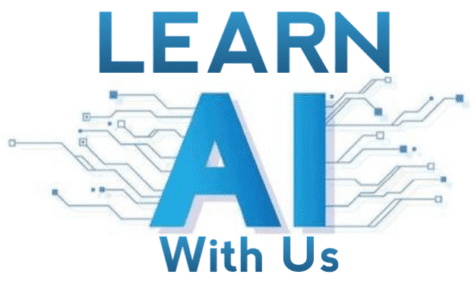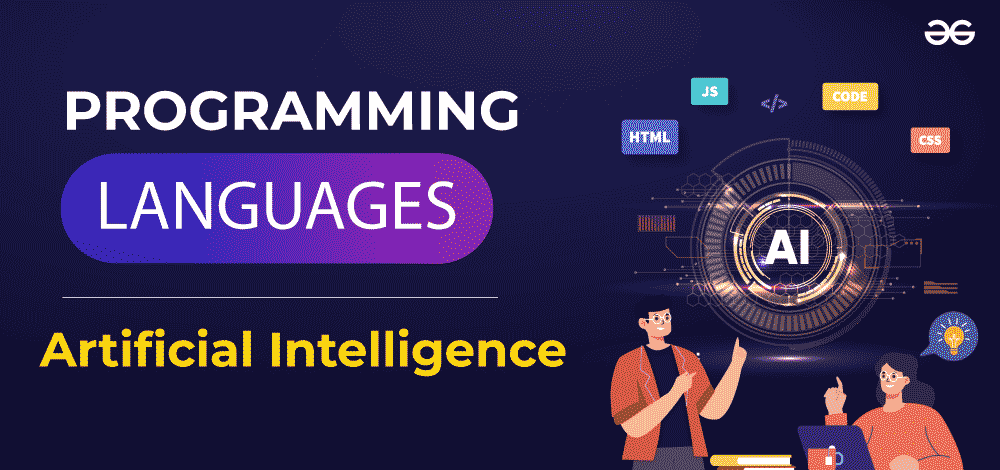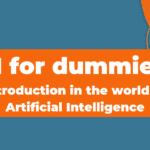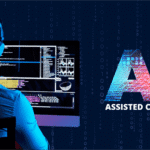Top 7 AI Programming Languages You Must Learn in 2025 (Beginner to Pro Guide)
Artificial Intelligence Isn’t Just the Future
Artificial Intelligence isn’t just the future. It’s actually here—it’s a reality everywhere from TikTok suggestions to self-driving vehicles. As 2025 draws near, AI experts are in great demand. However, not every programming language offers similar AI-centric capabilities.
If you’re just beginning to learn about AI development or want to improve your knowledge, choosing the right tools at the beginning is crucial to achieving success. If you’re starting out or you’ve played with code before, this guide will outline seven AI programming languages you need to be able to master by 2025, in basic English without technical jargon.
1. Python Is The King of AI Programming
Why Python Dominates AI Development
Python is similar to an Swiss Army knife of AI development. It is clean, easy to read code that has an extensive system of machine learning and deep learning, as well as computer vision and data analysis solutions – and not forgetting that it is easy for beginners!
TensorFlow and PyTorch – Popular AI Libraries in Python for Deep Learning
Scikit-learn Offers Traditional Machine Learning Capabilities
Pandas & NumPy – Tools for Data Manipulation
OpenCV Is a Computer Vision Software
Who Should Learn Python?
Anyone from high schoolers to Ph.D.s. If you’re committed to AI, Python should be the first language you choose. It has been regarded as the standard in industry!
2. R – The Data Wizard’s Language
R is a useful programming language that can be used for statistical analysis and visualization of data. It’s an indispensable tool when you conduct AI research and data analytics projects.
Best AI Toolboxes in R to Train Machine Learning Models
RandomForest – To Classify Random Values
ggplot2 Is a Stunning Tool for Data Visualization
R is usually preferred over Python in the field of Artificial Intelligence, while Python has greater AI frameworks. Data scientists generally prefer R, particularly those in academic fields.
3. Java – Scalable AI Solution
Java is a flexible platform that is ideal for the development of large-scale, enterprise-grade AI systems, such as recommendation engines for shopping websites and fraud detection for banks.
Tools and Frameworks in Java for AI
- Weka – Excellent Data Mining Tools
- Deeplearning4j – Java Deep Learning Library
- MOA (Massive Online Analysis) – Real-time data mining
Java’s Performance and Community Support
Companies around the globe are relying on Java because of the OOP architecture and its scalability, which makes it a great choice for AI applications. While it isn’t as user-friendly as Python, its performance is the same across many applications.
4. JavaScript as the AI Powerhouse for Web
In 2025, more AI applications will be running directly within browsers than they ever have before thanks to speedier processing power and TensorFlow.js libraries. This is what makes JavaScript among the fastest-growing programming languages used worldwide to support AI development.
AI Libraries Like Brain.js and TensorFlow.js
- Neural networks simplified
- TensorFlow.js is a program to run Machine Learning models in browser
- Synaptic offers architecture-free neural networks
JavaScript’s Advantage in Frontend AI Applications
For front-end AI applications such as chatbots and browser-based AI games, or applications for voice recognition, JavaScript is your ally.
5. Julia: Speed and Performance in Machine Learning
Julia is lightning fast, almost similar to C++—yet it is high-level and easy to read, similar to Python, making it a great choice for AI modeling, simulations, and computational tasks.
How Julia Connects Python as well as C++
Julia offers convenience and power in the raw, making it more sought-after in research labs and universities every year.
Apply AI and Big Data in
- Financial Modeling
- Space Simulations
- High-speed Neural Networks
6. C++ as the AI Engine Under the Hood
C++ may appear difficult, but it’s the core of a variety of AI engines. C++ is essential for those working in robotics, autonomous systems or games Artificial Intelligence development systems.
Integration Between AI Engines and Robotics
Popular robotics libraries such as ROS (Robotic Operating System) depend heavily on the C++ programming language. However, they integrate seamlessly with Python-based Machine Learning systems.
C++ Outpaces Modern Scripting Languages in AI
While C++ may be more difficult to write in, its speed, control, and performance are superior to those of scripting languages.
7. Go (Golang) Is Gaining Traction in AI
Go is widely known for its user-friendliness and speed. These attributes make it a popular artificial intelligence framework for cloud-based environments. While it’s not typically connected with AI applications, Go is rapidly becoming a popular choice for creating lightweight systems that can scale within a matter of minutes.
The Lightweight Concurrency and Scalability of Go
Go’s lighter model of concurrency and scalability is ideal to be used in real-time AI tasks like fraud detection and recommendation engines.
Projects and Use Cases That Demonstrate Artificial Intelligence in Go
- Microservices with Lightweight Neural Networks
- Edge Computing Using AI Inference
Are You Searching for the Ideal AI Language Based on Your Goals?
Career Path or Julia?
The best choice is Python, R, or Julia.
Develop Your Developer Skills?
Attempt Python, Java, or Go.
Focusing on Python and R as Data Analysis Tools?
Type of Project?
JavaScript.
Robotics?
C++
Visualization?
R
2025 Tips to Start in AI Programming
Written from Andrew Ng (Coursera AI for All).
Create Your First AI Project
Fast.ai for deep learning is an introduction to building AI projects like:
- Chatbots for spam emails
- Spam email classifiers
- Image recognition software
You can join Kaggle as well as Reddit’s machine learning r/MachineLearning community for additional information to assist you in this journey.
- AI Stack Exchange
TOP AI PROGRAMMING LANGUAGES (PICS)
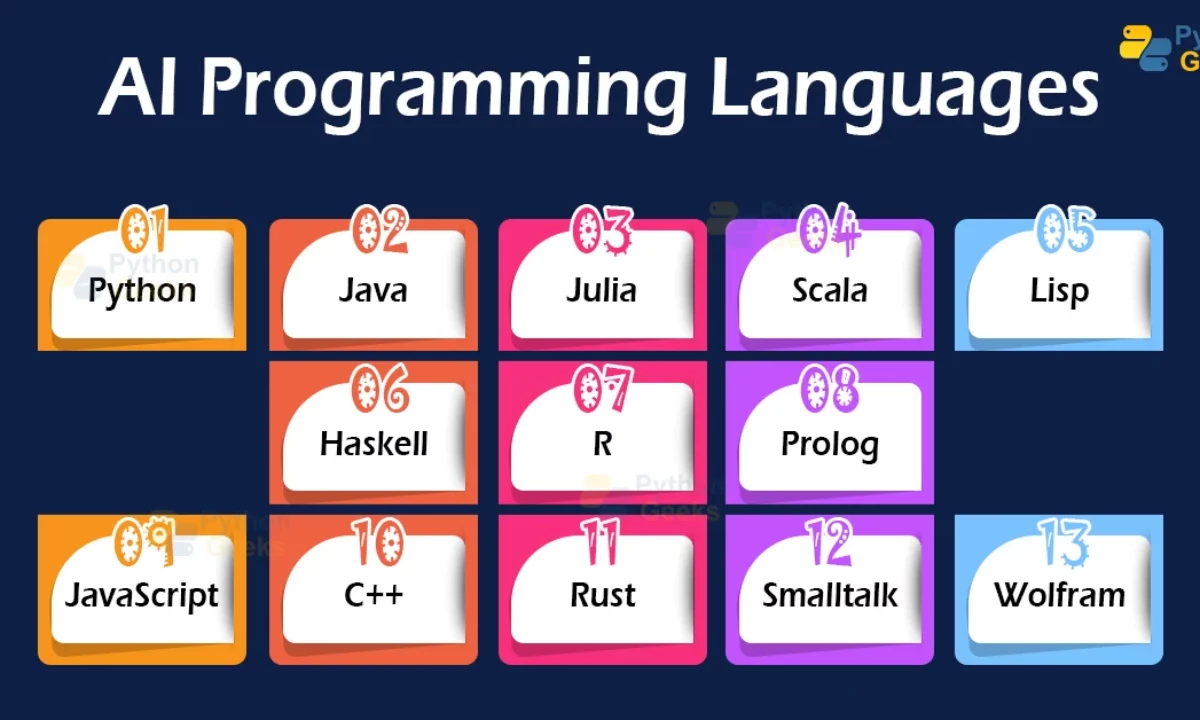
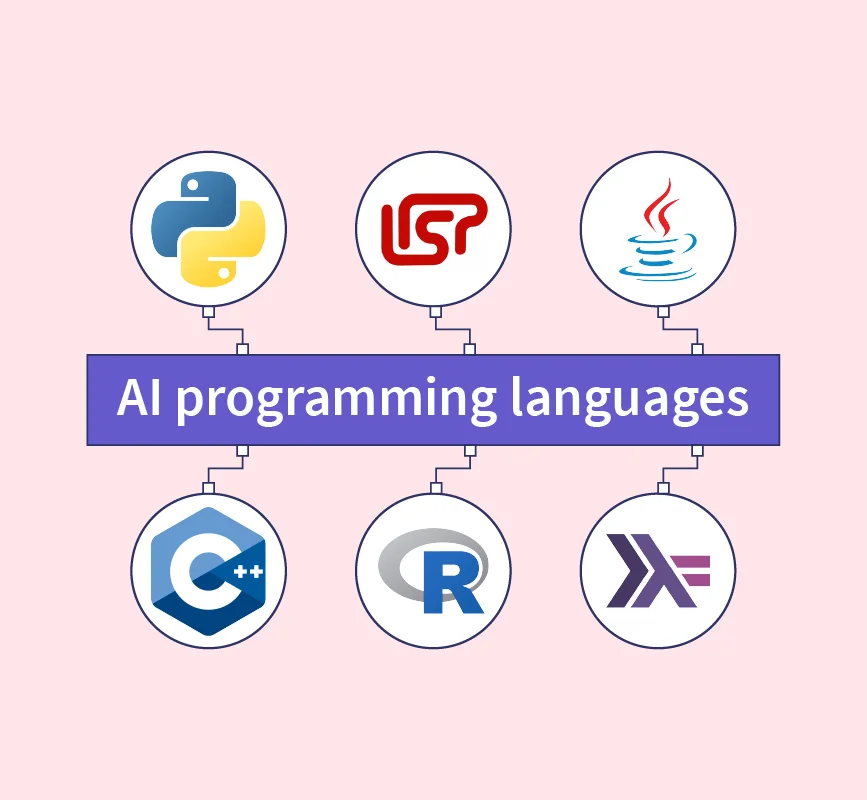
Final Thoughts
AI is constantly evolving and your selection of tools will determine the course of AI. While Python is still a favorite with AI users, other languages such as R, Julia, and Go are getting noticed in this field. Whatever your situation—whether you’re just starting to learn about AI from a different field or you are just beginning your AI study—learn any of the seven languages now to get an advantage in 2025 and even beyond!
So grab a cup of coffee, pick the language of your preference, and jump in—AI will be waiting!
FAQs
1. What is the simplest AI language to begin with?
In all likelihood, Python is without doubt the most simple AI language for beginners, providing tutorials, libraries, and community support to help you learn quickly.
2. Do I have the ability to study AI programming without having a CS degree?
Absolutely! Many AI creators are trained by themselves. The most important thing is consistency in learning and building projects.
3. Can Python serve as the base for the AI career?
Yes, for many positions. The addition of R, Java, or Julia experience adds more power and will give your AI career more feet to stand on.
4. What is JavaScript’s future in AI?
With TensorFlow.js and Brain.js taking huge strides ahead, AI based on browsers will be able to see exponential growth only up to 2025.
5. What is the time frame to master AI programming?
The timeframes differ, however when you put in the effort, small AI projects can be completed in just a couple of months. Being ready for employment can take between 6 and 12 months.
